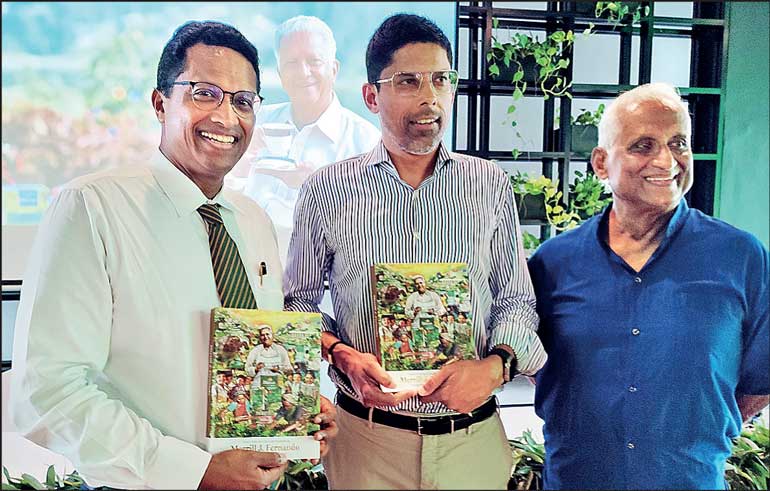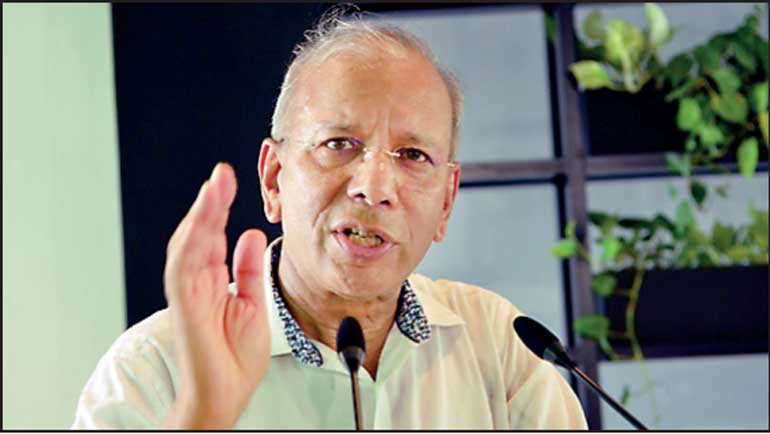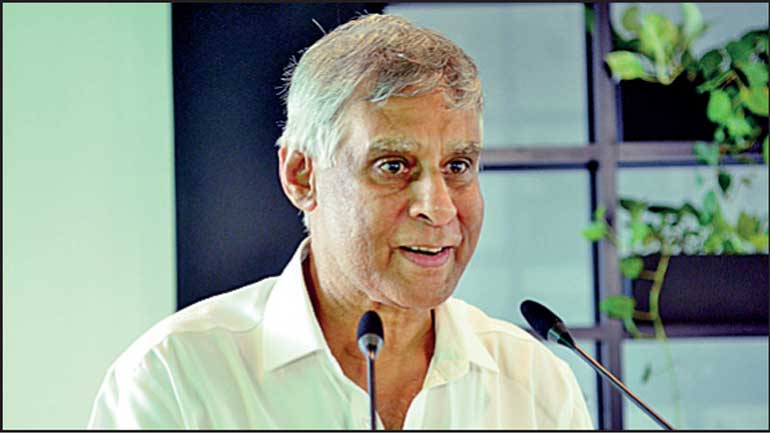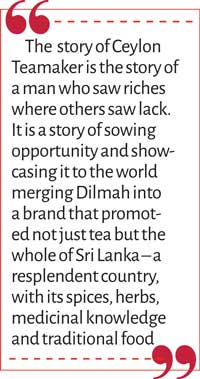Tuesday Mar 03, 2026
Tuesday Mar 03, 2026
Wednesday, 31 May 2023 00:05 - - {{hitsCtrl.values.hits}}

Dilhan Fernando, Malik Fernando and Anura Gunasekera
- Pix by Sameera Wijesinghe

Printcare Founder K.R. Ravindran

Himendra Ranaweera
By Surya Vishwa
International Tea Day was commemorated on 21 May. With it there were several newspaper items on Ceylon Tea, alongside some international centric events to promote local tea brands, carried out by various entities according to their purview and interest.
Introduced by the British to Sri Lanka, tea cultivation is part of colonial history and has represented oppression in how labour was extracted; cramped and non hygienic conditions of workers’ quarters and underpayment for gruelling work. There were also vast deforestation associated with tea cultivation and loss of indigenous plants.
Tea was a crop introduced to strengthen colonial coffers and the ultimate financial dividend of this industry served primarily the occupying nation. The brands that emerged in this background did not authentically represent Sri Lanka or its people. This was the bitter fact behind the beautiful gilded frame that Sri Lankan tea was brocaded into and marketed for many decades.
One Sri Lankan changed it.
Motivated by unbridled love for his country, people and tea, the belief that humaneness and business profit can survive together had been germinating as an idea in the mind of Merrill Fernando as a youth. Until the early 1980s he did not have the full financial means or the social backing to prove that this was doable; that industry, especially the tea industry could be crafted for the purpose of uplifting the wellbeing of the whole, including the planet and that money making need not be based on exploitation.
Yet, how did he achieve it? How are such high ideals formed in the human mind? Above all, how are they executed in a world where such thinking is labelled as utopian?
 To obtain the answers, one has to read the book, The story of Ceylon Teamaker; Merrill J. Fernando; Disruptor, Teamaker, Servant. This is the biography of Merrill J. Fernando, the icon of Pure Ceylon Tea, who took to the world the finesse of undiluted, pristine tea grown in his beloved island and made it an enterprise that directly benefitted the people of Sri Lanka.
To obtain the answers, one has to read the book, The story of Ceylon Teamaker; Merrill J. Fernando; Disruptor, Teamaker, Servant. This is the biography of Merrill J. Fernando, the icon of Pure Ceylon Tea, who took to the world the finesse of undiluted, pristine tea grown in his beloved island and made it an enterprise that directly benefitted the people of Sri Lanka.
The book is documented by veteran tea planter, Anura Gunasekera who worked with the Dilmah tea founder. The choice of words alongside the book title – disruptor, teamaker and servant is apt. The term servant seems synonymous with the role Merrill had played in uplifting thousands through his charities whether it is the aged, the disabled, the youth entrepreneurs, or those marginalised. It alludes to the fact that he had done so in humility and much out of limelight.
Anura Gunasekera writes in the book: “I wish to thank Mr. Merrill J. Fernando and his sons Dilhan and Malik, for having invited me to assist Mr. Fernando in the writing of his memoirs. I consider myself privileged to have worked closely with Mr. Fernando in the final decades of my career in the plantation industry but the greater privilege was collaborating with him, in writing the inspirational story of a truly extraordinary man.”
Launched by Dilmah Tea, to mark the 93rd birthday of Merrill J. Fernando which falls on 6 May, the book is much more than a biography. It is a textbook every single aspiring entrepreneur, policymaker and certainly anyone in the tea business should read. It requires slow reading to digest the flavours of compassion, kindness, and authenticity contained within it. To do justice to this book the Daily FT will sequalise it into three more segments. These components of the book review will cover its content covering insights relating to the politics of tea locally and internationally as witnessed by the Dilmah founder (and what the country can learn from his experiences for the future), the challenges of penetrating the international markets and the way forward. Overall the segments will feature, from accounts of his book, how Fernando created a brand that while rooted in tea, wove in diverse dimensions to aid the promotion of Sri Lanka, ranging from sports, climate protection, biodiversity nurturing and significantly, taking to the world Sri Lanka’s indigenous medicine and foods.
When one reads up to chapter 5 of the book The Story of Ceylon Teamaker, it is evident that the basic foundation of all what Dilmah as a company had done and is doing was constructed first in the village of Pallasena – within the growing up mind of the young Merrill.
He notes in the first chapter of the book titled ‘Beginnings’ that Pallasena is situated 15 kilometres north of the Colombo International Airport and that before the airport was even thought of, it was a village that was home to a cluster of about 100 closely knit families. The values of selflessness that guided and shaped that rural bond is spoken of in a straightforward manner. A reader familiar with Sri Lanka will understand that yesteryear this was similar for almost all villages of this country whether these villages were predominantly Buddhist, Hindu, Muslim or Catholic.
Whatever the religion the common spiritual values represented key pillar of village life, shaping productive and kind minds. Sinhala Catholic villages such as Pallasena, which were few in number when taken as a whole, served as did the Sinhala Buddhist ethic in rural life, to educate in children and youth qualities such as generosity, love and compassion and this was done by the village being concerned about every single family as a part of rural kinship.
Merill points this out how any celebration or mourning of one family became the concern of all and the entire village contributed to ease that suffering or to celebrate that joy, in practical ways. As the temple was to Buddhist villages, the church was the moral compass of Pallasena.
The matriarchs of the family, the mother and grandmother of Merril are described in a real to life manner where we can picture the influence they had on their children and grandchildren. The first seeds of the charities that the Dilmah carries out but hardly takes publicity based credit for is evident in the description of how generosity and kindness marked the family’s actions in the village to those who were not as privileged as them.
On reading the book one can see that the rare dedication to promote Sri Lanka’s downtrodden, vilified and even ridiculed traditional medicinal knowledge, that Dilmah has taken on, first through Merrill and then his sons Dilhan and Malik, are traced to the matriarchal line of the family.
The maternal great grandparents of Merrill Fernando, followed by his grandmother and grand aunts had been traditional physicians. They had specialised in the treatment of cataract and eye diseases. He speaks of the herbal oil his grandmother and aunts made which would ensure a headful of black hair even after the age of 70. In this anecdote, anyone who knows the efforts of Dilmah to promote herb associated entrepreneurship of especially youth, motivating them to safeguard what is indigenous, will recognise where that enthusiasm originally sprang from. Merrill details out the medicines made by his grandaunts pertaining to eye treatments and states that he was assigned the embarrassing job of collecting from breastfeeding mothers, spoonfuls of milk which formed an essential ingredient of the eye treatment medication.
“My mother was a role model in my early years and became a defining influence in my development as an adult as well. She represented an uncompromising moral power,” states Merrill of Lucy Fernando, in chapter 2 titled My Parents and explaining that she died at the age of 98 in her home in Pallasena where she lived throughout. “My love and admiration for her have been constant. She taught me a great lesson in life – to love my neighbour as myself and to share with those in need. She instilled in me at a very early age the concept that moral values cannot be compromised, irrespective of circumstances or the nature of the temptation,” he recollects.
He then states what many spiritual gurus advising business leaders explain; that one can only prosper when one dedicates financial contribution for the betterment of all and not when one grudges that. That this thinking can be powerfully built into the mind at a young age and inculcated within the family where children learn from what they see and not what they are told, is evident in the narration of his childhood and what he learnt from the actions of his mother.
Harry, his father is said to have been a simple, humble and hardworking man who worked a long day at his brick and tile manufacturing business commuting mostly by foot or bullock cart. In chapter 3 titled My siblings, he speaks of his five other sisters and brothers, all of whom were older than him; three girls, Agnes, Doreen, Rita and brothers Lennie and Pius. This chapter speaks of the course of life they chose and details of their offspring. Chapter 4 titled School years covers his school years first at the Pallasena village school and then St. Mary’s in Negombo. In this chapter we also read about how he was sent to study for priesthood at the St. Aloysius seminary in Borella, but returned home after four years following the decree by the Catholic priests that he was not fit to be a man of the cloth! He continued his education at the Maris Stella College in Negombo and later at St. Joseph’s College in Colombo.
Contd. on Page 19
Review...
In chapter 5 titled The shaping of my future, we read the beginning of how Merrill enters into the territory of tea. Although someone who does not know him may be forgiven for thinking that he may have been well endowed in the tea world, probably with a couple of tea estates running in the family, we can see how the only tea plantations that Merrill had access to as a youth were those of his affluent friends. Among these he mentions the estates of Punduluoya and Kotmale districts belonging to K.R. Mathavan and his brothers, Karuppiah and Arumugam as well as their uncle S. Thondaman who later was to become the President of the Ceylon Workers Congress (CWC).
The Daily FT will continue the review of the book that speaks of the life story of Merrill J. Fernando in its upcoming editions. The intention of serialising the review is for it to be an inspiration for those such as policymakers and entrepreneurs. The story of Ceylon Teamaker is the story of a man who saw riches where others saw lack. It is a story of sowing opportunity and showcasing it to the world merging Dilmah into a brand that promoted not just tea but the whole of Sri Lanka – a resplendent country, with its spices, herbs, medicinal knowledge and traditional food.